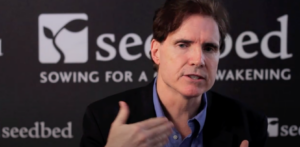At our downtown ministry this week, I watched a precious soul rock an invisible baby while “Away in a Manger” was being sung and I was overwhelmed by the values of God and his preference for the poor.
It is completely antithetical to our human nature to seek after and invest in the hidden places where the poorest of the poor live and yet this is the very heart of God. He refuses to forget the ones forgotten by the world: the almost-hermit with decades-old depression, the woman who rocks an imaginary baby, the mentally ill one who changed names two or three times in the course of an evening, the one who celebrated her approval for section-eight housing as if it were good news to be poor enough to need rental assistance.
Jesus doesn’t forget them.
In fact, he looks for the ones who look like him and the prophet tells me, “He had no beauty or majesty to attract us to him, nothing in his appearance that we should desire him” (Isaiah 53:2). Which means we are left to learn how to love the unattractive, to desire the company of the undesirable. We are also left to wrestle with an uncomfortable truth: To enter into the heart of Jesus is to submit to hidden, unglamorous work.
When Isaiah was deep into the work of penning a weighty bit of prophecy about the coming Messiah, he took time to describe how this Redeemer would deal with people. He said He would not break a bruised reed or snuff out a smoldering wick.
Glenn Penton writes about this. In the days of Isaiah, shepherds would pass the time out in the fields by making a simple flute out of a reed. It was something to do, but also a kind of protection. They’d play it at night to let predators know that the sheep were not alone out there. But a reed flute being played by a boy-shepherd is not going to last long. It gets bent, stepped on, bruised.
Rather than trying to save a broken flute, the shepherd would toss it and make a new one. Same with their candles. They’d make cheap candles by floating a piece of flax in oil. Flax makes a great flame but when the oil gets low, the flax falls over into the oil and then you just get smoke. It is easier to make a new candle than to fish out a smoldering flax and repair it.
God told Isaiah we would know the Messiah by the way he treats the broken reeds and damaged wicks — the ones with personality disorders and bi-polar conditions and divorce and addiction and poverty. From the world’s perspective, reeds and wicks are disposable. “Toss these, and get new ones.” That is the world’s take on those who are banged up, stepped on, bruised, face down and smoldering.
Not so in the Kingdom of God. The true Messiah sees hope in even the most hopeless souls and by His power makes all things new. He specializes in the reclamation of bruised reeds and smoldering wicks. He makes things and people work again.
And this is what makes Christmas worth doing. Because at its core, it is so much more than warm feelings, family dinners and big gifts. Christmas is God stepping in when all hope seems lost to rescue the ones the world would just as soon give up on.
Lest I sound more holy than I am, I have to admit that this fact grates against all my unholy ambitions. It is also the very source of my sanctification. God has told me the path to righteousness. It is to love justice, do mercy, walk humbly … to fall in love with the people who break his heart. He wants my work to bear his image. This is tough spiritual work for ambitious people but it turns out to be the only option if his heart is my hope.
This is the only path that makes the anxiety and busy-ness of Christmas worth the trouble. So I pray for you and me both that in this season, we will learn what it really means to embody the very heart of Christ, to do the hidden work of incarnational ministry, to allow ourselves nothing less than that which builds the Kingdom on earth.








